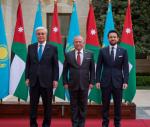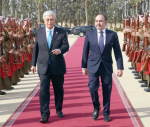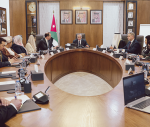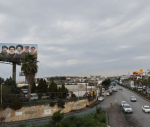You are here
Words of wisdom from another ex-general
Oct 27,2016 - Last updated at Oct 27,2016
Senior colonels and generals in the United States armed forces have more rational views of the conditions around the Middle East than their civilian politician commanders who send them to war there — and send them again a decade later, and once again two decades later, as has been the case over the past quarter of a century.
So I was intrigued to read the comments this week of one former US general who called for a “Marshall Plan” to rebuild the Middle East in order to prevent the rise in the future of other organisations like Daesh, which the US and almost everyone else in the region and the world now fights militarily in northern Syria and Iraq.
Unlike the more sober military officers, elected politicians in Washington and elsewhere tend to pay more attention to those who they feel ensure their political incumbency or reflect the hysteria of the day in American public opinion, such as campaign donors, special interest groups, lobbyists, pollsters, and indigenous and international hucksters like native neoconservatives and those Iraqis like Ahmad Chalabi who lobbied for war in Iraq.
This is why the US has been actively at war in the Middle East and South Asia for a quarter of a century.
Much more sensible are the views of former generals like John Allen, an ex-special presidential envoy for the global coalition to counter Daesh, who told the BBC last weekend that “the trajectory we’re on is not promising. We’re going to have to think differently about how we’re going to solve these issues, otherwise we are going to be condemned to interminable conflict and that should not be what we bequeath our children.”
He is right, since his generation’s political leaders have already left Americans an embarrassing legacy of a quarter of a century of almost universally futile warfare — given that the Taliban in Afghanistan are resurgent these days, Al Qaeda has regrouped and continues to pop up in new countries, and Daesh has spent two years building its “Islamic state” (which is now under attack).
Daesh has also been developing small cells of followers around the world, even though most of its adherents are social misfits or dysfunctional individuals whose problems could more effectively be resolved by efficient social services agencies or simply decent government that offers citizens jobs, security, dignity and opportunity.
Providing these basic things to citizens is clearly the key to a stable, non-violent Middle East, and the generals who have to fight these interminable and futile wars clearly recognise this — though they only seem able to make their views known when they retire from active duty.
Said Allen: ”The solution isn’t a military solution. The solution is a concerted action by the community of nations to work with the fragile states of the region, or those states which are assailed by social instability, to try to help them to create that social stability within the population in which people feel as though they have hope, they can identify with the central government and they become committed to remaining home and remaining part of that society, rather than being radicalised — feeling as though they have no future in that country and joining these extremist organisations.”
His focus on “the fragile states of the region, or those states which are assailed by social instability” is important; in fact, it describes almost every country in the Arab world, with the exception of a few oil-rich emirates with small populations that have not experienced any significant stresses to date, given their unique configurations.
Conditions in half a dozen Arab states with active wars, and another half dozen with serious internal stress that leads to dangerous religious, social and political polarisation reflect the common problem across the region that no Arab state has resolved: Population growth continues to outstrip economic growth, and no political mechanism exists to allow citizens to deal with the consequences of this.
Only a small minority of Arabs enjoys quality of life improvements, while the majority languishes in chronic low-income or deep poverty life conditions that result in desperation and extreme responses of people with no opportunities, little hope and no voice in governance, along with an urgent need to feed their children.
The responses vary: Daesh, Al Qaeda, north Sinai-like violent insurrections, the non-violent Muslim Brotherhood and its many offshoots, illegal migration, criminal gangs, hundreds of informal tribal and other militias, corrupt state-linked activities and many, many others.
When the Arab uprisings erupted in late 2010, the total Arab population was 348 million (according to World Bank data); today, it is 400 million. In the past six years, 52 million new Arab citizens were born.
The idea that the prevailing Arab order and foreign policies of major Western and other countries (Israel, Iran Russia, Turkey) can respond to this growing crisis of citizen needs and state distress across the Arab world is delusional — but it is the very idea that drives the policies of all Arab governments and all those foreign powers, with the addition of continuous military action to add some spice to this poisonous recipe.
General Allen is worth hearing out.













